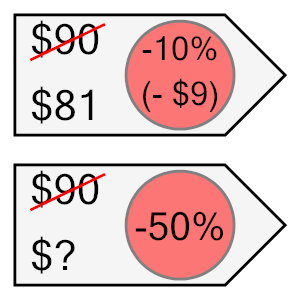This math topic focuses on calculating a percentage reduction of a number using 10% multiples. It introduces and practices the concept of finding new values after reducing the original numbers by specific percentage amounts, such as 10%, 50%, 70%, 90%, and even 100%. Learners are provided with the initial computation of 10% of various numbers and then asked to determine the remaining amount after the reduction. Multiple-choice questions are used to assess understanding of percentage reductions.
Work on practice problems directly here, or download the printable pdf worksheet to practice offline.
morePercent reduction of a number (10% multiples) - Concept Intro Worksheet

| Math worksheet on 'Percent reduction of a number (10% multiples) - Concept Intro (Level 2)'. Part of a broader unit on 'Percentages - Intro' Learn online: app.mobius.academy/math/units/percentages_intro/ |
1

| If a 10% discount makes a total of $63, what total would a 50% discount make? |
a
| 25 |
b
| 44 |
c
| 35 |
d
| 26 |
e
| 32 |
f
| 19 |
2

| If a 10% discount makes a total of $36, what total would a 70% discount make? |
a
| 16 |
b
| 15 |
c
| 17 |
d
| 9 |
e
| 11 |
f
| 12 |
3

| If a 10% discount makes a total of $81, what total would a 50% discount make? |
a
| 65 |
b
| 38 |
c
| 45 |
d
| 56 |
e
| 29 |
f
| 27 |
4

| If a 10% discount makes a total of $36, what total would a 80% discount make? |
a
| 8 |
b
| 11 |
c
| 4 |
d
| 7 |
e
| 12 |
f
| 10 |
5

| If a 10% discount makes a total of $36, what total would a 60% discount make? |
a
| 19 |
b
| 16 |
c
| 23 |
d
| 18 |
e
| 14 |
f
| 13 |
6

| If a 10% discount makes a total of $18, what total would a 90% discount make? |
a
| 2 |
b
| 3 |
c
| 0 |
d
| 4 |
e
| 1 |
7

| If a 10% discount makes a total of $72, what total would a 80% discount make? |
a
| 13 |
b
| 14 |
c
| 22 |
d
| 11 |
e
| 16 |
f
| 20 |